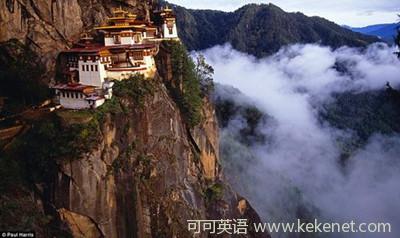
在20世紀的大部分時間,喜馬拉雅山下的不丹王國幾乎完全為世界遺忘。誠然,對一個到1999年才允許使用電視和網絡的國家而言,20世紀已經與不丹擦肩而過。這是一片布滿深谷與宗堡(當地一種相當于要塞的建筑)、落在搖搖欲墜的山巔上的土地,是世界上最隔絕、最不發達的國家之一。今天它依然與世隔絕,然而這不再是一種偶然——不丹的傳統文化受到嚴格保護,游客受到細致的管理。這是世界上唯一禁止出售煙草、連首都也找不到交通燈的國家;在這里體驗一個被時間遺忘的地方,這種機會不是一次尋常假期,而是一種特殊禮遇。
Once upon a time in a country far, far away lived a most unusual king who proclaimed that in his tiny Himalayan kingdom, "Gross national happiness is more important than gross national product." Although most of us give lip service to the cliché, "Money can't buy you happiness," in our hearts we believe a big pile of cash can make a sizable down payment and put smiles on our faces. To us, if a country's economic development isn't measured in dollars, it doesn't make sense. So the story of Bhutan sounds like a fairy tale.
Even Bhutan's nicknames—Land of the Thunder Dragon, the Kingdom in the Clouds, the last Shangri-la—evoke a fantasyland. I've come here for a reality check, to immerse myself in Bhutanese culture, to see if fairy tales do come true and people can live happily ever after.
It's not Sunday, but I'm in church, or rather, a Buddhist temple inside our hotel in the city of Paro. The monk is conducting a ceremony, offering us blessings for a safe journey and giving us packages of prayer flags to take along. Their significance becomes clear a couple of days later when I arrive at Dochula Pass just above 10,000 feet on a fog-shrouded, narrow, no-shoulder highway. Religion isn't just "A Sunday Kind of Love注" for the Bhutanese. Buddhism is part of daily life, the foundation of the culture.
Isolation from the outside world used to shelter Bhutan's unique culture, but that's changing. A 94-year-old local tells me, "When I was younger, I kept hearing stories about big powerful machines called trains that could carry people quickly over long distances. I wanted to see one for myself, so I walked six days to the Indian border. There I hitched a ride on a truck, which was the first motorized vehicle I'd ever seen, and rode ten hours to see my first train."
Bhutan still doesn't have its own trains, but in 1962 it got its first road and in 1983 its first (and only) international airport. Now I'm one of only about 25,000 tourists who find their way here each year. Far greater outside influence arrives via satellites and computers thanks to King Jigme Singye Wangchuck—the fourth Dragon King of Bhutan—having lifted the ban on television and the Internet in 1999. Will this new technology "bring good things to life," as the TV commercial goes? I can only report that for the half hour I spent watching people watch TV, the crowd was mesmerized by the latest episode of Bhutanese Idol.
Traveling the country, I visit the village of Kingathang, where a local farmer invites me to try some fresh- brewed arra, the local spirit. He gives me a tour of his home and introduces me to the 12 family members, covering four generations, who live together under one roof. It is a scene I will see repeated again and again—old caring for young, young helping old, and all regarding it as the natural order. While visiting people in their homes, I also visit monasteries and temples to try to understand the philosophy that shapes the culture and inspires the national policy of Gross National Happiness.
I save the best temple for last, the Tiger's Nest Monastery, nestled 10,200 feet high on the side of a cliff. According to legend, Guru Rinpoche, who is credited with bringing Buddhism to Bhutan, was carried here on the back of a flying tigress. The monastery followed in 1692, built to mark one of the most holy sites in Bhutan. Fortunately, given today's shortage of flying tigresses, I can follow a foot trail to the top. I planned to ask a monk some grand question about the meaning of life. Instead, once I arrived I had more pressing concerns and simply requested a new set of knees so I could make it back down the mountain. I'm not sure I gained any insights into the secret of Gross National Happiness up here, despite the great view.
Who knows whether the people in the faraway Kingdom of Bhutan will live happily ever after, but for now it's official government policy to foster that goal. And according to people who measure such things, the Bhutanese are in fact the happiest people in Asia and among the happiest in the world. My advice: See this country before it changes. There aren't many places like it. Some of the contentment here may be contagious. A bit of it even rubbed off on a cynic like me—at least for the time I was in Bhutan.
不丹趣聞
不丹王國,簡稱不丹,是位于中國和印度之間喜馬拉雅山脈東段南坡的一個內陸國,首都為廷布。該國的國名在當地語言叫“竺域”,意為雷、龍之地。梵語中,“不丹”解作“吐蕃的終結”。不丹人口67萬,不丹族約占總人口的50%,其余為尼泊爾族等。西部不丹語言“宗卡”和英語為官方用語,南部操尼泊爾語。不丹的教育、醫療等社會服務都是免費的。為了保留傳統文化,民眾上班、上學必須穿著傳統服裝,建筑必須遵從傳統的風格。射箭是不丹的國術。
不丹于英國萊斯特大學的“世界快樂地圖”(World Map of Happiness)獲得全球排名第八。2004年12月17日,不丹政府宣布全國禁煙令,這是世界上第一個全面禁煙令。不丹也是世界上最后一個開放電視與互聯網的國家。注:《星期天的愛》(A Sunday Kind of Love)是一首1946年的經典流行曲,后被多次翻唱。











